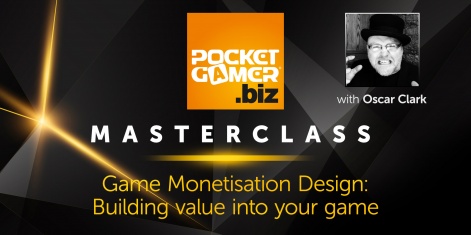New for 2020, the second round of PocketGamer.biz MasterClasses are only just around the corner.
They're a brand new series of deep-dive workshop sessions taking an in-depth look at practical games design topics. We’re working with the finest industry experts to create professional, half-day activities featuring tutorials, lectures and breakout groups, all accessible from the comfort of your home office.
There are four workshops taking place on December 1-3 where you can expect to explore a range of key games design topics, from game design to monetisation and investment. Today, we'd like to introduce Oscar Clark, Chief Strategy Officer at Fundamentally Games, who will lead a session titled Game Monetisation Design: Building value into your game on Wednesday December 2nd from 14:00 - 17:00 (UK time).

Oscar Clark is Chief Strategy Officer of Fundamentally Games LTD whose mission is to bring games to live. He has been a pioneer in games services since 1998 helping developers design, deliver, monetize, and operate games live. He literally wrote the book “Games As A Service” published by Routledge.
Tell us a bit about your company
Fundamentally Games helps game developers bring their game to live.
We provide support for design, monetisation, data, and testing to build a constantly improving LiveOps experience. We work as partners to allow developers to focus on making their game, while we get more players, doing more things, more often, for longer.
What does your role entail?
I jokingly refer to myself as the 'Chief of Curiosity' which means my job is to try to understand what makes games work and apply that to the benefit of the teams we work with. This ranges from game and monetisation design to market due diligence and even marketing. That means my work is highly varied and one day I may be digging through the raw data of a game to identify what is happening and how they can improve their retention and revenue and the next day I may be designing game systems and testing strategies. We have also helped some investment teams assess the market potential for games.
Additionally, I run a lot of workshops and masterclasses, currently exclusively online, and not just to Game Development companies. Over the last 12 Months we have run workshops for Greenpeace, The Children's Society and Whizkidz charities as well more game developers than I can count. Since we raised seed investment for Fundamentally Games in April our focus has been on offering game team LiveOps-as-a-service; to help them get more people, doing more things, more often, for longer.
We need to consider how each element of the game affects anticipation, expectation, as well as communicating opportunity cost and anticipation.
Is there anything you’re working on currently that you’d like our readers to know about?
We are currently offering a free review for game developers - where we look at their game (all platforms) and give a high-level assessment of its market potential and game/retention/monetisation design. We include actionable recommendations in these reports and of course how we think the game can benefit from running LiveOperations.
What topic will you be covering in your MasterClass?
In my MasterClass I'm going to explore "What is the best way to charge for your game?"
This is not a simple choice between Pay-Upfront or Pay-In-Game. We need to consider how each element of the game affects anticipation, expectation, as well as communicating opportunity cost and anticipation. All of those are questions of design; not just economics. We need to apply a game designer's mindset if we are going to create a better experience for players; rather than the clumsy negative techniques that too often have frustrated players so badly.
In the workshop I'm going to explore three key areas:
Player Utility. This may seem like a heavy duty phrase but this is all about how we practically break down what our players love in the game. Only by doing this can we really understand what players really want and to make sure that how they pay for the game works with the overall experience. We want players to feel that the game is better because of the way we charge for each element and what that says about value in the game. My Player Utility framework approach uses four types (Subsistence, Shortcuts, Strategy and Social); four forms (Consumable, Capacity, Generator, Aspiration) and uncovers the best form of exchange for those elements (Time, Currency, Anchors and Ratchets)
Meaningful Impact. I think if people part with their hard earned cash, then the impact on their game experience should be meaningful; but at the same time that doesn't mean that its impact should break the game. So I plan to explore the role of price, ‘hotdog economics’, Win/Loss ratio, strategic variations, VIP programs, BattlePass, unboxing, time-limited offers and even the role of Ads in creating a deeper, ongoing sense of value for players that is deeply rooted in the enjoyment of play. Not just for the person paying, but why it is essential that this positively impacts everyone playing.
Understanding the Player lifecycle means we understand how their perception of value changes over time and this introduces new opportunities to build ongoing and more sustainable value.
Player Lifecycle. The core lesson from 22 years of working with Games as a service is that we have to pay attention to the player lifecycle. As players move from Discovery to Learning; before they start to truly engage their needs change. If we support and communicate with them in the right way we may even have the privilege to discover that they become 'SuperEngaged'. Tragically, we have historically confused this state with the idea of 'Whales' and in this Masterclass I will explain why that is a bad strategy and why we need to create ways for every player to maximise their engagement with our game rather than just focus on big spenders at all cost. Understanding the Player lifecycle means we understand how their perception of value changes over time and this introduces new opportunities to build ongoing and more sustainable value with ongoing, predictable events, promotions, content and feature releases. Designed well each element can build more trust, more value and more engagement.
Who is this MasterClass for?
This masterclass is for anyone who is serious about making commercial games. It doesn't matter if you are Indie or if you work in AAA; attending this session will hone your focus on creating revenue in games that players want - not that frustrate or annoy them. It's about building value in the game experience which can create a better game because of the way you charge for it.
Why is it important for your games industry peers to gain a deeper understanding of your chosen topic?
We have seen some truly awful implementations of charging in games - from opaque and arguably exploitative loot crates to stuffing otherwise launch features into expensive day 1 DLC packs; not to mention the ratcheting up of upfront charges for packaged games with each new console generation. I believe these decisions come from false assumptions such as believing a game is 'worth it' because of the costs to develop or cynically pushing "how can we get more money out of whales". Instead I believe we need to realise we have the single most popular digital entertainment form on the planet; and that we can deliver value for players that they crave in unique, smart, transparent and incredibly delightful ways.
Tell us a little bit about the key takeaways people can expect from the session
People who attend this workshop will come away with a different way to look at game monetisation by design; in particular:
- How to break down what players will want to buy specifically in your game and what forms that should take.
- How to maximise a player’s sense of value for their purchases; without breaking the game (i.e. avoiding Pay-To-Win)
- How offers, bundles, different forms of exchange (time and money), unboxing and VIP programs can improve player’s willingness and satisfaction from the game overall
- How to intelligently innovate your game through your monetisation design
Making games never lacks innovation and the kinds of stories and experiences we will see as we come out of this period will be amazing.
Finally, what are your thoughts on the games industry going forward? What major trends do you predict over the next 12 months?
We have been extremely fortunate to have been involved in an industry which has been considerably less affected by the pandemic than any other (only online retail and medical technology have had it better). That however, doesn't mean we have come out without impacts and the need to change. The world has moved online and that means we need to embrace that ever more. Unfortunately, that hasn't yet had an impact on new games investment and I know that smaller teams and new start-ups have found the time really challenging. Additionally, too many larger studios have not been able to adapt quickly enough and too many folks have been left behind.
Making games never lacks innovation and the kinds of stories and experiences we will see as we come out of this period will be amazing; but it will take us time to adapt to the new normal. What this seems to be doing at the moment is reinvigorating party-like social games online like Fall Guys and AmongUs.
I suspect all games need to pay more attention to how to make social elements more meaningful; learning from experiences where other players are the reason to play - not (as happened with Social Games between 2007-2009) just an exchange of your facebook list for in-game consumables.
Book today!
If you like the sound of Clark's MasterClass, be sure to book your place now - remember tickets are limited so purchase your ticket today to avoid disappointment!
Multi-buy deals and corporate discount
Want to attend multiple MasterClasses? Book three workshops and get the fourth FREE!
Booking for multiple people? Take advantage of our 30% corporate discount for groups of six or more people from the same company.
For multi-buy or group discounts, please email sally.kevan@steelmedia.co.uk to discuss your bespoke package.





















